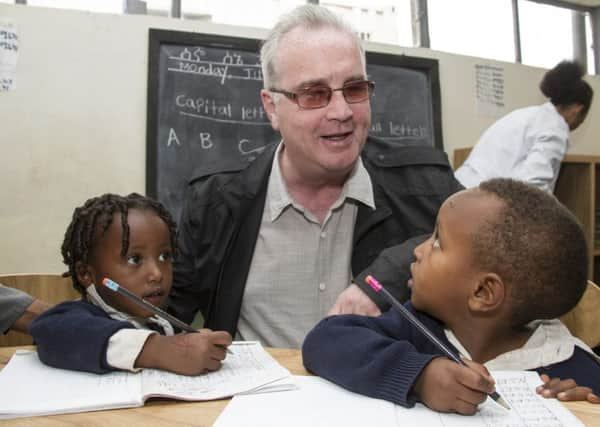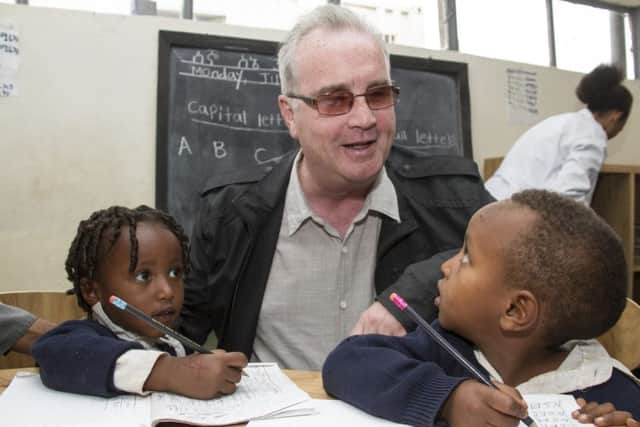Video: Richard Moore marks 20 year mile stone in mission against injustice


As the group celebrates a milestone anniversary, Richard talked to the Journal about how his own remarkable recovery from the brutal injustice of being shot in the face by a British soldier when he was a boy, inspired an ongoing mission to improve the lives of young people in some of the most impoverished regions of East Africa.
“I was pretty naive when I started Children in Crossfire,” said Richard. “The motivation, I think, was down to my own experience of being shot and blinded.
Advertisement
Hide AdAdvertisement
Hide Ad“But not being shot and blinded in itself. I think, it’s the reaction, to me being shot and blinded. I think that’s very important.”


Richard says the extent to which his own community rallied around him following the shooting helped him achieve such a positive and rounded outlook.
“I’m talking about things like, you know, my family, and initially the community in the Creggan estate, that rallied behind me and my family. And the people of this town.”
Richard sees Children in Crossfire as a natural way of sharing this positive energy and addressing injustice elsewhere in a constructive manner.
Advertisement
Hide AdAdvertisement
Hide Ad“What happened to me was totally unjust, was totally wrong, but, at the end of the day, why was I able to accept it? Why was I able even to meet the soldier and forgive the soldier. It was because of the people around me.


“Because of that example all I ever wanted to do was to give back what I received.
“Any child who experiences the injustice of poverty deserves the opportunity to live and grow and develop and contribute to their community in the way that me and other people have contributed to their community and that’s all that these people are asking for in Africa.
“Sometimes people ask the question: Why is there a developing world and why are people living in poverty all these years on when you think about it?
Advertisement
Hide AdAdvertisement
Hide Ad“But you know the world has grown but it hasn’t developed fairly and the gap between the rich and the poor has continued to grow and it has made the situation of people in the developing world worse.
“Poverty is not just about charity, it’s about justice, it’s about fairness, it’s about people being given the same opportunities.”
Looking at the scale of what the charity has achieved and is achieving, giving people these opportunities, principally in Tanzania, Ethiopia and Malawi, is remarkable.
Take these numbers: £25million raised to tackle poverty in 10 countries; 250k people supported during the Malawi famine of 2002; 2,500 Tanzanian children receiving cancer treatment between 2008 and 2014; 59,000 Tanzanian children accessing early childhood education; 50,000 people with access to clean water in Ethiopia.
Advertisement
Hide AdAdvertisement
Hide AdRichard says the work is ongoing and current programmes are making a real difference and saving people’s lives.
“In the South Shewa zone there’s one hospital that would be the size of the square on St Joseph’s Avenue, which is meant to provide medical care for 1.2m people, which is impossible to do.
“So we’ve fitted out a therapeutic feeding centre there - basically an intensive care unit where children are suffering from malnutrition. The statistics are showing that since the programme started about five years ago the amount of children dying from malnutrition has come down by 70 per cent. That’s not my statistics that’s the hospital’s statistics.”
He explains how Children in Crossfire’s work with a desperate community in Addis Ababa was also turning lives around until the crises of famine and drought prompted another emergency last Christmas.
Advertisement
Hide AdAdvertisement
Hide AdHe remembers being confronted by a horror story on his first visit ten years ago.
“There were 260 people living in a graveyard, there were children there. At least 50 per cent of them were children. Young girls were child prostitutes on the streets of Addis Ababa just to earn money, young girls, I’m talking about 7 or 8 years of age, it was heartbreaking, they were living and sleeping on top of graves.”
Children in Crossfire built an apartment block and a school for the families.
“Three years later it was amazing, the children were out dancing wearing their school uniforms. They were warm, they were dry, they were comfortable,” said Richard.
Advertisement
Hide AdAdvertisement
Hide Ad“Now that programme was virtually coming to an end because the families were beginning to work and get jobs, they had their own wee businesses...but in the north of the country you’ve had a famine, which affected 15million people so that affected the food prices.
“I got an email on Christmas Day last year to say: look we’re in dire straits. Basically, they were facing a starvation situation. So again because of Children in Crossfire’s fundraising programme the money was there. We were able to release money right away during the Christmas week for that community and we will continue that feeding programme now up until the end of December this year.”
Richard says he feels the need for Children in Crossfire is as strong now as it ever was and explains how he often feels the echo of history in the course of his charity work.
“I remember going to Louisburgh in Mayo and walking to the famine graves and you hear about the Irish famine and you’re standing at the famine graves. It’s a very sombre moment but when I was in Africa in 2001 and went up to the famine graves the people had just died the day before we got there.
Advertisement
Hide AdAdvertisement
Hide Ad“I kind of felt I had one foot in Irish history and the another foot in the present.
“I was walking down from the grave with this African woman and she said to me, there’s one thing worse than dying from hunger and that’s watching your children die from hunger
“The Irish famine came about, not because there wasn’t enough food in the world, but because there was an injustice and there wasn’t the will.
“There are people dying in Africa today. In some of the villages we work in, one in five children are dying before they reach five years of age and they are not dying because there isn’t enough food, they are not dying because there isn’t enough money, they are dying because there isn’t enough will in the world and that’s what makes it wrong.”